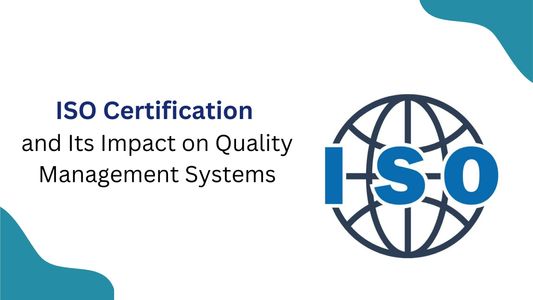ISO Certification and Its Impact on Quality Management Systems
 Register Services
24 Jan, 2025
11 mins read
297
Register Services
24 Jan, 2025
11 mins read
297

In today’s world, businesses and organizations are constantly striving to improve their operations and ensure the highest quality of products or services for their customers. One of the ways to demonstrate a commitment to quality is by obtaining ISO certification. But what exactly is ISO certification, and how does it impact the way a company manages quality? Let’s break it down in simple terms.
What is ISO Certification?
ISO stands for the International Organization for Standardization, a global body that creates and publishes standards for various industries. The purpose of these standards is to guarantee the safety, dependability, and quality of goods, services, and systems. ISO certification is a formal recognition that a company or organization meets these international standards.
The certification is issued after an organization undergoes a detailed assessment by an independent, accredited third party. This body checks whether the company’s processes, systems, and practices align with the relevant ISO standards. If they do, the organization receives ISO certification, signaling that they adhere to globally recognized standards.
There are several types of ISO standards, but the most well-known and commonly sought-after is the ISO 9001 certification, which focuses on quality management systems (QMS).
What is a Quality Management System (QMS)?
A Quality Management System (QMS) refers to the policies, procedures, and practices an organization uses to ensure that its products or services meet customer expectations and regulatory requirements. Think of a QMS as a blueprint for ensuring that everything a company does aligns with its goal of delivering high-quality products or services. A good QMS helps organizations:
- Improve efficiency
- Reduce errors and waste
- Enhance customer satisfaction
- Stay competitive in the marketplace
ISO 9001 is a standard that guides organizations in setting up and maintaining an effective QMS.
The Impact of ISO Certification on Quality Management Systems
Now, let’s dive into how ISO certification impacts a company’s Quality Management System and why it’s beneficial to businesses.
Improved Efficiency and Consistency
One of the most significant benefits of implementing a QMS based on ISO standards is the improvement in efficiency. ISO 9001 requires companies to document their processes and procedures. This documentation helps employees understand the steps they need to follow to perform their tasks correctly and consistently.
For example, if a company produces a product, ISO standards would require the organization to define and document every step in the production process—from procurement of raw materials to the final packaging. With this clear guidance, workers are less likely to make mistakes or miss important steps, leading to more consistent and higher-quality products.
Better Customer Satisfaction
ISO certification places a strong emphasis on customer satisfaction. By adopting a QMS, organizations are required to listen to their customers, understand their needs, and measure their satisfaction.
For instance, ISO standards might prompt a company to establish regular feedback mechanisms such as surveys or customer reviews. With this data, the company can make adjustments to improve the customer experience. Since customer satisfaction is a core part of ISO 9001, companies that are ISO-certified often deliver products and services that better meet customer expectations, which in turn leads to higher customer loyalty and retention.
Cost Reduction and Waste Minimization
An effective Quality Management System helps businesses identify areas where waste can be reduced. ISO 9001 encourages companies to constantly evaluate their processes and look for inefficiencies. By eliminating unnecessary steps, improving workflow, or investing in better equipment, a company can reduce costs associated with errors, delays, and waste.
For example, by standardizing procedures for inventory management, a company can reduce excess stock or eliminate the costs associated with spoilage or expired goods. With ISO, organizations are continuously improving their processes, which leads to long-term savings.
Enhanced Risk Management
Every business faces risks—whether it’s the risk of a supply chain disruption, customer dissatisfaction, or product defects. ISO certification requires companies to proactively identify and assess potential risks within their processes and work on minimizing them.
Having a robust risk management strategy in place helps companies handle unforeseen challenges more effectively. For example, if a company faces a sudden change in customer demand, ISO-certified organizations would already have contingency plans in place to adapt quickly without disrupting their operations.
Stronger Reputation and Brand Image
ISO certification is widely recognized and respected around the world. Being able to display the ISO logo on your products or marketing materials communicates to customers that your company is committed to quality and adheres to internationally recognized standards.
For many businesses, obtaining ISO certification is a way to differentiate themselves from competitors. It serves as a stamp of approval, providing a sense of trust and credibility to customers. This recognition is particularly important when competing in global markets, where customers and clients expect high standards of quality.
Regulatory Compliance
Another significant impact of ISO certification is ensuring compliance with laws and regulations. ISO standards often align with legal and industry-specific regulations, helping companies stay up to date with compliance requirements. By maintaining a QMS that is certified by ISO, companies can ensure that they are always operating within the legal framework and avoid fines or penalties for non-compliance.
Employee Morale and Engagement
ISO certification isn’t just beneficial for customers and stakeholders—it can also improve employee engagement. By standardizing processes and providing clear guidelines, employees often feel more confident in their roles and responsibilities. Knowing that there are established procedures to follow can reduce confusion and mistakes.
Moreover, when employees understand that their company is striving for continuous improvement, it can be a great motivator. ISO-certified organizations tend to have a culture of teamwork and shared goals, which boosts morale and enhances productivity.
Continuous Improvement
ISO standards place a strong focus on continuous improvement. This means that certified organizations are encouraged to constantly assess their performance and look for areas to improve. Whether it’s refining customer service, improving product quality, or streamlining operations, the focus is on always moving forward.
This commitment to improvement keeps businesses agile and responsive to changes in the market. Companies that adopt ISO standards don’t just achieve a one-time improvement in quality—they are set up for ongoing success.
Note: Apply for iso 45001 certification-occupational management systems
Conclusion
ISO certification has a significant impact on quality management systems by helping businesses improve efficiency, satisfy customers, reduce costs, minimize risks, and maintain a strong reputation. It ensures that companies adhere to globally recognized standards and provides a framework for continuous improvement. For businesses, becoming ISO-certified is more than just a badge of honor—it’s a commitment to delivering the best possible quality and value to customers.
Whether you’re a customer seeking reliable products or a business owner considering the benefits of ISO certification, it’s clear that ISO plays an essential role in shaping how quality is managed and delivered in the modern business world.
Written By:
Register Services



Hotels at your convenience
Now choose your stay according to your preference. From finding a place for your dream destination or a mere weekend getaway to business accommodations or brief stay, we have got you covered. Explore hotels as per your mood.





